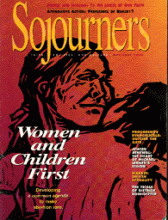Bill Pelke had come a long way from the day he had a vision of his murdered grandmother while atop his crane at a Portage, Indiana steel mill to the day he told his story to a Gary, Indiana high school classroom seven years later. He had traveled the distance between a desire for revenge and the need for reconciliation. It remains an unfathomable gap to some, including his close family members.
When Pelke finished telling the Lew Wallace High School class how he had come to forgiveand even lovea former student of their school who had brutally killed his grandmother, some shook their heads. Some gasped. "You must have a big heart," one girl said. Pelke replied, "I have a big God."
"I believe in God, too," the student said, "but I believe nobody has the authority to take anybody else's life."
Pelke's response: Exactly. And that "nobody" includes the State of Indiana. That is why he ended up fighting the death sentence handed down July 11, 1986, against 16-year-old Paula Cooper, who had pleaded guilty to killing his grandmother. Cooper's sentence was commuted to 60 years, meaning she'll serve 30 if given the standard half-time for good behavior.
Pelke, along with Marietta Jaeger, whose daughter was snatched out of her tent on a camping trip, are two of the 1,500 members of Murder Victims Families for Reconciliation, a group of people who have experienced the murder of a loved one but who oppose the death penalty. MVFR works like a leaven of forgiveness and nonviolence in a culture prone to revenge and retribution.
Read the Full Article

